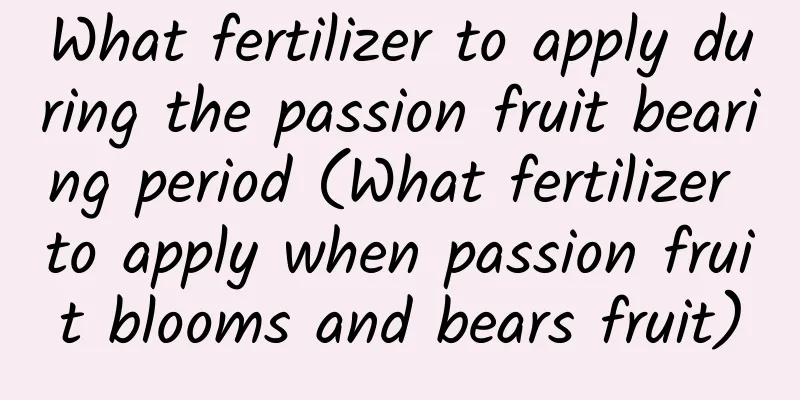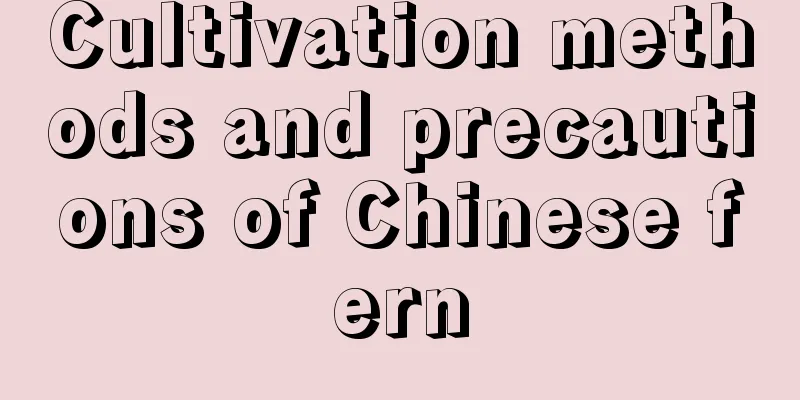What fertilizer to apply during the passion fruit bearing period (What fertilizer to apply when passion fruit blooms and bears fruit)

|
Although passion fruit is a fruit tree, its growth habits are more like melons. Therefore, its management and fertilization are very different from those of ordinary fruits. Especially in terms of fertilizer use, the fertilizer plan should be adjusted according to the growth stage of the passion fruit. Fertilizer requirements of passion fruitFirst of all, passion fruit requires a relatively large amount of fertilizer because it can bear fruit in the same year it is planted. Therefore, many growers choose to plant once a year, which increases the demand for fertilizer. If the fertilizer cannot keep up, the final yield will definitely decrease. Secondly, passion fruit has a relatively large demand for nitrogen fertilizer and potassium fertilizer, followed by phosphorus, calcium, magnesium and other elements. In addition, other medium and trace elements such as boron, zinc, and iron should also be supplemented. Finally, passion fruit's fertilizer requirements also change at different growth stages. For example, passion fruit needs more nitrogen fertilizers during the budding period, phosphorus, boron and other elements during the flowering period, and potassium and calcium fertilizers during the fruit expansion period. How to fertilize passion fruit for high yieldPassion fruit fertilization is divided into several stages, namely base fertilizer, topdressing during the seedling stage, topdressing during the flowering period and fertilization during the fruit expansion period. The base fertilizer is mainly organic fertilizer and microbial agent, and it can also be combined with calcium magnesium phosphate fertilizer to loosen the soil and improve soil fertility. Fertilization during the seedling stage should be adjusted according to the situation of base fertilizer. If the base fertilizer is sufficient, fertilization can be reduced during the seedling stage. If the base fertilizer is not particularly sufficient, then you can apply an appropriate amount of high-nitrogen compound fertilizer. Generally, fertilizer should be applied once every 2 weeks after the passion fruit grows new leaves. Fertilization during the flowering period is mainly based on phosphorus. High-phosphorus water-soluble fertilizer can be used. The fertilization time is half a month before flowering and after the flowers fade. If the number of flowers is relatively small, you can skip fertilizing after the flowers fade. The fruit swelling period is an important link in the passion fruit fertilization process because it is directly related to the later yield and quality. During the fruit-swelling period, topdressing mainly uses phosphorus and potassium fertilizers . High-phosphorus water-soluble fertilizers and high-potassium water-soluble fertilizers can be used in combination, and calcium, magnesium, boron and other trace elements can be supplemented at the same time. What fertilizer should I use when passion fruit is ripe?Many people don’t know that passion fruit juice is actually all in the pseudo-skin of the seed. So if the seed is not fully developed, the fruit will naturally have less juice in the later stage. Therefore, in order to ensure that the juice content can reach a certain level, phosphorus fertilizer is indispensable to promote the development of passion fruit seeds. We can use drip irrigation to provide phosphorus fertilizer in each irrigation. Of course, you can also use leaf fertilization, which has the advantage of reducing soil disturbance and is also a good way to supplement phosphorus fertilizer for passion fruit. Although potassium fertilizer does not have a big impact on the yield of passion fruit, it can make the passion fruit plants stronger. Therefore, the application of potassium fertilizer should be strengthened within half a month after the passion fruit blooms, because this half month is the rapid growth period of the passion fruit. If a certain amount of potassium fertilizer can be applied appropriately, the growth of the fruit can be better guaranteed. Finally, although passion fruit is a fertilizer-loving plant, you should also pay attention to the concentration and location of fertilizer. Because passion fruit is also prone to fertilizer damage, be careful not to apply fertilizer too close to the root system, and also avoid applying fertilizer at too high a concentration or applying uncomposted organic fertilizer. |
Recommend
What is the best way to treat yellowing lucky bamboo leaves?
With its elegant posture and evergreen leaves, lu...
Ginger flower cultivation methods and precautions
1. Temperature It prefers a growing environment w...
The importance of root care for succulent plants
The importance of root care for succulent plants ...
What does mugwort look like? How much does it cost per pound?
1. Morphological characteristics 1. Stems and bra...
It is better to water succulents every few days
How often should I water my succulents? Succulent...
How to prune the roots of Schefflera arborvitae
Does Schefflera need root pruning? Schefflera nee...
After seeing these names of roses, I just want to kill the person who named them
Bad implication The heritage flowers are beautifu...
What kind of soil is suitable for potted jasmine?
Potted jasmine soil The growing soil for potted j...
How to water rose potted plants
Key points for watering rose potted plants Rose p...
Can leftover Coke be used to water flowers? What flowers can be watered?
Can leftover Coke be used to water flowers? Gener...
Dig 1 spoonful of seeds and put it in the pot, and grow it into a small potted plant in 7 days!
How to grow kiwi on the balcony? Planting steps: ...
What to do if the leaves of the money tree turn yellow
1. Normal Aging When yellow leaves appear on the ...
Why does yew drop its leaves?
1. Caused by watering When watering, if you don&#...
How to distinguish between Chinese potherb mustard and bitter chrysanthemum
1. Leaf Difference The leaves of Chinese mustard ...
How to grow cilantro (planting method and time)
1. Planting time Planting is usually carried out ...









